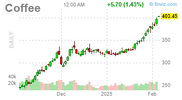- Joined
- 24 December 2005
- Posts
- 2,601
- Reactions
- 2,065
https://247wallst.com/commodities-m...nt-translate-to-cheaper-coffee-for-consumers/
Why Lower Coffee Futures Prices Won’t Translate to Cheaper Coffee for Consumers
Well thankfully that isn't true at my supermarket!
I just bought a 400g jar of Moccona coffee for $14 that is $2 cheaper than I have ever been able to buy it before. Thankfully my Robert Timms coffee bags regularly go on special for half price. If anyone has not tried these, they are awesome especially the Italian Espresso and so convenient.







